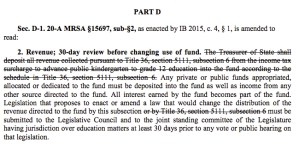AUGUSTA — The governor’s proposed budget would do away with a school-funding surtax on the state’s top earners approved by voters in November.
Question 2, which voters narrowly passed on Nov. 8, raised taxes by 3 percent on annual incomes of more than $200,000; that money would go to K-12 schools.
Gov. Paul LePage has argued that the added tax would bring the total tax rate to 10 percent for high earners and keep them out of Maine.
The measure was projected to raise $159 million in 2018, with Lewiston schools getting $4 million of that amount, Auburn getting $3.26 million and Oxford Hills schools, $3 million.
According to the governor’s budget, released Friday, the Fund to Advance Public K-12 Education, which would collect the 3 percent tax, would be abolished.
However, House Democrats are committed to upholding “the will of the voters and improving public education funding in Maine,” Assistant House Majority Leader Jared Golden, D-Lewiston, said Tuesday.
The governor’s budget “is an effort to ignore the voters’ intent in regard to Question 2,” Golden said. “Voters said they wanted to raise taxes on the wealthiest Mainers to make sure state (education) funding reached 55 percent,” the level mandated by state law but never fulfilled.
To bypass the referendum “flies in the face of the democratic process,” Golden said. “We’re not just talking about a minor change. We’re talking about a budget proposal that does the exact opposite of what voters said.”
Golden said that instead of raising taxes on the wealthiest Mainers, top earners would “have their taxes cut in half and schools would be underfunded.”
Proposed changes on state education funding, such as no longer paying for administration, would push costs onto property taxes, Golden said, adding that’s something his caucus will oppose.
LePage has contended that approval of the question was merely a “recommendation” from voters.
The Maine Education Association, which brought the referendum question to the ballot, says otherwise.
“The MEA (the statewide teachers’ union) is adamant that the voters have spoken in Maine, that Question 2 needs to go forward,” MEA President Lois Kilby-Chesley said Tuesday.
In a budget letter to state legislators last week, the governor said Maine voters didn’t understand the specifics of the ballot questions.
Implying that they didn’t know what they were doing “does not give credit to voters in Maine,” Kilby-Chesley said.
LePage spokesman Peter Steele said in an email Tuesday that leaving Question 2 intact would hurt the state.
Maine’s financial position has improved, Steele said. Income is up, unemployment is low and the state is meeting its obligations.
“Unfortunately, liberal special-interest groups are trying to reverse all of Gov. LePage’s fiscally responsible reforms” through the referendum process, he said.
Approval of the referendum means “Maine has gone from moving in the right direction to having the second-highest top-marginal tax rate in the country at 10.15 percent,” Steele said.
In the governor’s budget message, LePage said California, a rich state, has the highest tax rate in the country, but Maine is not California. Maine cannot afford “to chase professionals out of our state and watch our small businesses close because of this Draconian new tax rate,” LePage said.
The governor said state lawmakers must have a serious conversation about respecting the will of the voters while protecting Maine’s economy.
Proposed changes in the state’s school funding formula will “put students and teachers first,” according to the governor’s budget message. Rather than spend money on “bloated administrative structure,” LePage is recommending reforms, such as spending state money only on direct instruction, accountability and teachers, Steele said.
Also, incentives for voluntarily regionalization of school districts would free up more money for classrooms and students, according to the governor’s budget message.

Comments are no longer available on this story